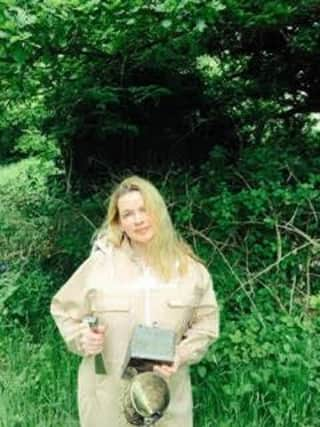Beekeeper's wife cured of lethal sting allergy


The wife of a Hook Norton commercial bee keeper has developed a potentially life-saving resistance to bee stings following ground breaking treatment.
Lucy Zaichenko, 47, was unaware that she was allergic to bee stings until she was stung on the end of her finger by a bee in her home which caused her to go into severe anaphylactic shock.
Advertisement
Hide AdAdvertisement
Hide AdAnaphylactic shock is when a person’s immune system overreacts to a mostly harmless substance resulting in a variety of potentially life-threatening reactions.
In Mrs Zaichenko’s case her body swelled-up, she could not breathe, she collapsed and became unconscious and was rushed to hospital.
During the summer months Mrs Zaichenko and her husband, Viktor, keep 700 colonies consisting of 150 million bees on their farm, so the potential to be stung again was very real.
Mrs Zainchenko said: “I used to have to cover myself from head to toe if I went outside the house, because of the danger of getting stung, and as the bee sting had weakened my immune system it had left lots of secondary problems, so it was a very frightening and difficult part of my life.”
Advertisement
Hide AdAdvertisement
Hide AdMrs Zaichenko was referred to St Mary’s Hospital in Paddington, part of Imperial College Healthcare NHS Trust, which is home to the UK’s oldest allergy clinic with over 100 years’ experience in allergy vaccines, since providing the world’s first allergen immunotherapy treatment in 1911.
She was diagnosed with a life-threatening allergy to bee stings and was offered immunotherapy to bee venom. This treatment involves gradual exposure to bee sting venom to build-up the bodies immunity.
In the initial stages of the treatment Mrs Zaichenko was injected with bee venom the equivalent to just 1/10,000th of a single sting.
Over time, Mrs Zaichenko’s tolerance increased and she can now tolerate the equivalent of two bee stings and has top-up injections every six weeks.
Advertisement
Hide AdAdvertisement
Hide AdDue to the high probability that she could be stung again Mrs Zaichenko will continue to receive long-term treatment.
She said: “When I discovered I was allergic to bee stings I was devastated.
“My husband is from a long-line of bee farmers and bee keeping is his passion as well as our livelihood.
“Every day I was risking my life by being at home because the bees often come into the house as well as the garden.
“It was difficult to know what to do.”
Advertisement
Hide AdAdvertisement
Hide AdShe continued: “The immunotherapy has been life-saving in more ways than one.
“It has meant that I can still live on the farm and run our business without having to worry about getting stung as I know my body can deal with it.”